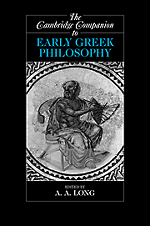Book contents
- Frontmatter
- 1 The scope of early Greek philosophy
- 2 Sources
- 3 The beginnings of cosmology
- 4 The Pythagorean tradition
- 5 Heraclitus
- 6 Parmenides and Melissus
- 7 Zeno
- 8 Empedocles and Anaxagoras
- 9 The atomists
- 10 Rational theology
- 11 Early interest in knowledge
- 12 Soul, sensation, and thought
- 13 Culpability, responsibility, cause
- 14 Rhetoric and relativism
- 15 Protagoras and Antiphon
- 16 The poetics of early Greek philosophy
- Bibliography
- Index
2 - Sources
Published online by Cambridge University Press: 28 May 2006
- Frontmatter
- 1 The scope of early Greek philosophy
- 2 Sources
- 3 The beginnings of cosmology
- 4 The Pythagorean tradition
- 5 Heraclitus
- 6 Parmenides and Melissus
- 7 Zeno
- 8 Empedocles and Anaxagoras
- 9 The atomists
- 10 Rational theology
- 11 Early interest in knowledge
- 12 Soul, sensation, and thought
- 13 Culpability, responsibility, cause
- 14 Rhetoric and relativism
- 15 Protagoras and Antiphon
- 16 The poetics of early Greek philosophy
- Bibliography
- Index
Summary
DOXOGRAPHI GRAECI
Because the works of the early Greek philosophers have been lost, our knowledge of their content is entirely dependent either on sparse verbatim quotations (though less sparse than for instance those relating to the early Stoics) or on various forms of reportage in all sorts of ancient authors. It has thus become customary to begin books of this kind with a critical review of our sources of information.
What is at stake is the reliability of these sources. The ideal of an objective history of philosophy is a nineteenth-century invention. In antiquity history of philosophy was part of systematic philosophy, serving a variety of purposes. The ideas of earlier philosophers were used and interpreted in many ways, and, more often than not, served merely as springboards. This holds not only for the attitude of major thinkers such as Plato and Aristotle but also for the far humbler works consisting of collections of doctrines, with or without some biographical detail, that circulated on a fairly extensive scale. Such works were used, it would seem, in the context of a primary education in philosophy and also as quarries to be exploited whenever someone writing about a philosophical issue felt he should set off his own view against those of others, to improve upon an already existing view or to replace it with another.
- Type
- Chapter
- Information
- The Cambridge Companion to Early Greek Philosophy , pp. 22 - 44Publisher: Cambridge University PressPrint publication year: 1999
- 7
- Cited by

